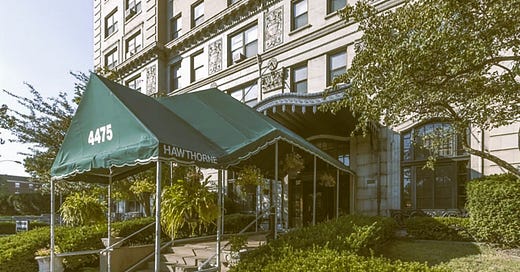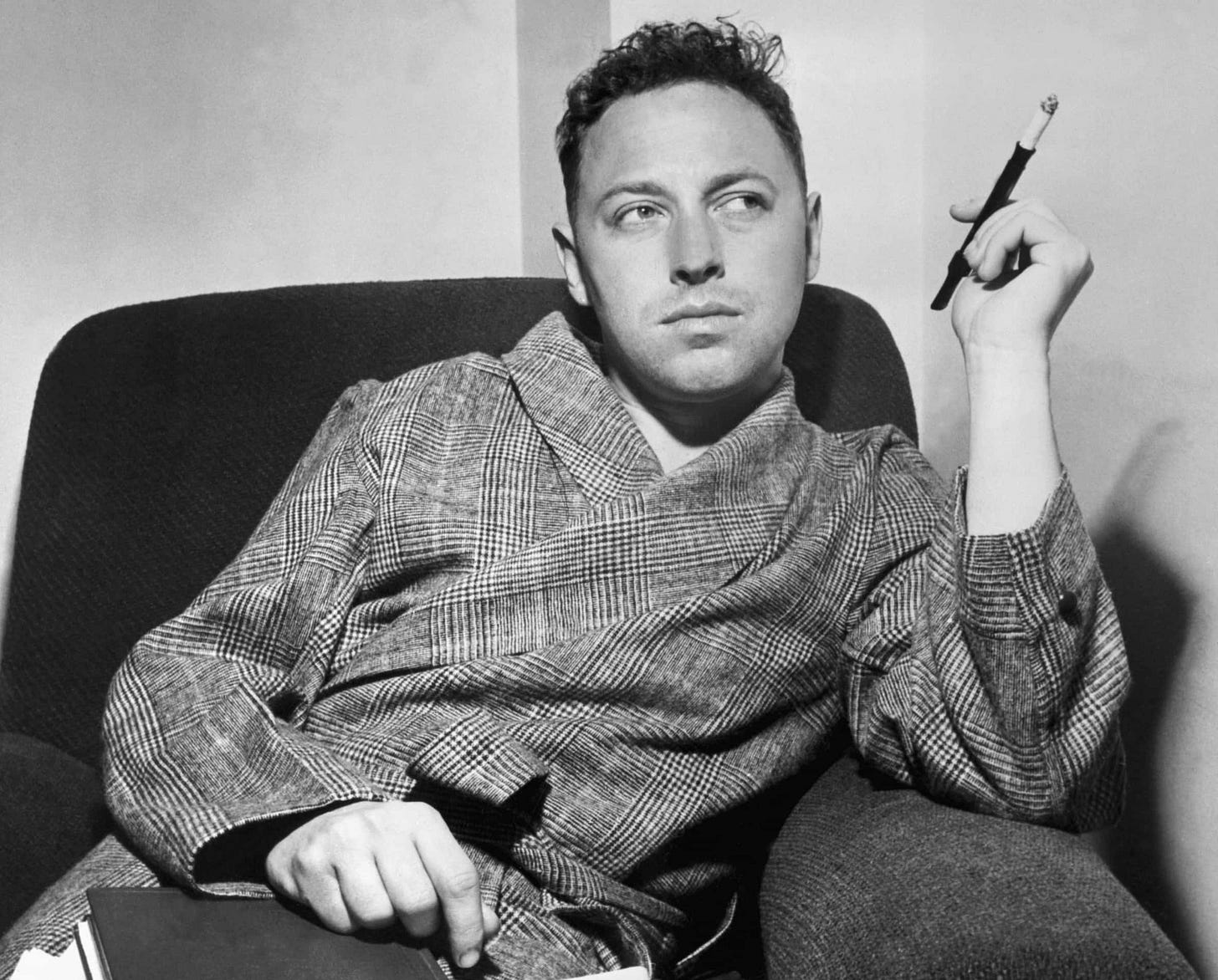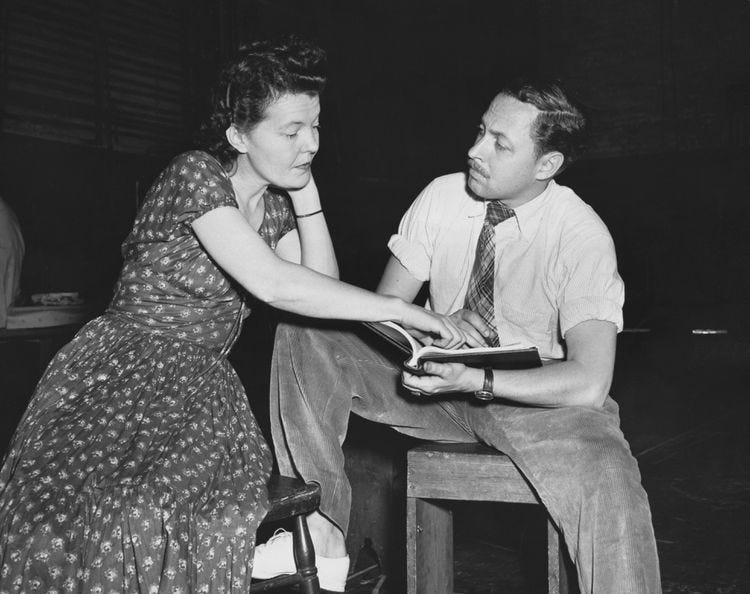An Old Man and His Memories – Pt 3: Meeting Tennessee
Looking Back at a Long Queer Life
(Note: And so we continue An Old Man and His Memories, the final section of our historical trilogy. Our Narrator, whose memories stretch back to a youth of love and discovery in Paris, told in Song of the Amorous Frogs; and then a middle-age of art and discovery in Houston, continued in Left Bank on the Bayou; has now grown old, and lives his days, as he has for 30 years, in an apartment in the Hawthorne, in St. Louis, and in his memories: an apartment that had once been theirs, now his alone, and memories that had once been theirs – his and so many others in his life – now also his alone, because only he is still alive to remember them.)
After decades of nibble nibble nibble, the time-eating monster now seemed to be gulping larger and larger bites of the little time I had left. I tried not to dwell on it, since I could do nothing to change it. Well, not quite nothing, but the something had not yet become an option I chose to take. Though I could imagine a time when I might. Especially now that our menage had been reduced by the life-gobbling monster to me alone. But for now, even just remembering sufficed for getting through the days.
But why be so morbid on such a beautiful day!? Just remembering has its own beauties. And as I turned into West Pine on the way back to my Hawthorne sanctuary (yes, now mine alone – mine and my memories), I thought back to a day in that other April all those years ago, a day not unlike this one, with clear sky and fresh air, with a boyish charm teasing me into feeling almost boyish myself, as I walked up my then new street, the petals, swirling around me in the breeze, even pinker in memory than the ones that swirled around me this day as I walked the same route up my now old street.
This day I greeted now old Doorman Jimmy as I walked through the lobby, as I had greeted Young Jimmy then; I took the same elevator up to the same floor; and opened the same door with the same key into the same apartment.
That day, as I stepped into the entry, I heard an unfamiliar voice, a southern accent almost juicy and swallowed, spoken as though the tongue might almost be too large for the mouth, occasionally cut by a raspy laugh that relieved the tension which seemed to come as a requisite adjunct of the words.
“One must be known in order to be forgotten. I will be known. I assure you of that. The other part will be as it may.”
They both laughed, this unknown person of the voice, and Clem. I stopped for a moment before going on into the main room, wanting to hear more of the voice before it became tethered to a person. I saw them from behind as they spoke, looking toward the windows.
Clem said, “Tell me more about the harrowing encounter with trade you mentioned in your letter.”
“This is the first time that anyone ever knocked me down and so I suppose it ought to be recorded. Why do they strike us? What is our offense?”
The mellifluous voice lingered on “strike” and “offense,” pulling out of the words all the drama they contained.
“It was a case of guilt and shame in which I was relatively the innocent party, since I merely offered entertainment which was accepted with apparent gratitude until the untimely entrance of other parties.”
He closed his eyes and tilted his head back as he continued, going back in memory to a world more real than the room he sat in at the moment.
“We offer them a truth which they cannot bear to confess except in privacy and the dark – a truth which is inherently as bright as the morning sun. He struck because he did what I did and his friends discovered it. The sort of behavior imposed by the conventional falsehoods.”
He opened his eyes and touched his finger to his cheek.
“My face was swollen from the blow – but the donor will remain in my memory always, and as a lover, not antagonist. There was something incredibly tender and sad in the experience. So much of life at its most haunting and inexpressible.”
He looked at Clem directly as he continued, “Not that I like being struck, I hated it, but the keenness of the emotional situation, the material for art – these gave a tone of richness to it which makes the affair unforgettable among many that melt out of sight.”
As I entered the room and Clem saw me, he brightened and gestured in my direction.
“Here he is, the Houston friend I mentioned – the one who knows your Margo Jones.”
The person of the voice looked at me and smiled and nodded.
Clem continued, “ And this is Tennessee – the budding playwright I wrote you about.”
Now I thrill at the recollection of being there on the verge of a career as brilliant as the brightest comet in the night sky. But then he seemed just one more talented aspirant to life in drama – of which there had been so many – including me, for a time – and so many would flame out and fade away quickly, as even the brightest stars grow dim with approaching day. Of course, his star, or comet (or whatever celestial body one might choose to liken such a talent to) would blaze – before even it dulled eventually.
“I have been away from St. Louis so long – in New Orleans and New York, and most recently in Jacksonville, working for the War Department – in a very minor role, but part of the war effort none the less,” he said, as we chatted, the spring sun flooding through our windows.
“Except for these two” – he nodded toward Clem and Our Cellist, absent but implied, away now at a symphony rehearsal – “I have no friends here, see nobody, but every afternoon about five thirty or six I go down on the river-front and have a beer and listen to a juke-box in one of the dusky old bars that face the railroad tracks and the levee. That is the only part of St. Louis which has any charm.”
Clem reminded him that there were a few places not far from the levee at which he might meet St. Louis “friends.”
“And I do have a great deal of tension building up, if you know what I mean, which will demand release at some point. But the local Belles are not to my liking – and I wouldn’t risk trade here where my parents and my grands live. Though, with all the comings and goings of the war, there is such a lot of lovely fresh trade – in uniform – passing through the city – many so naïve, and fearful from the hygiene lectures thrust on them by their officers, that the level of their “tension” almost approaches mine – and makes them so ripe for “release” of a kind the lectures do not include.”
I had not had much exposure to such gay repartee since my time in New York, almost a decade before. It had grown tiresome then, and would likely have soon grown tiresome again – though perhaps not, coming from such an acid witty tongue as his. But soon the conversation shifted to theater, about which this new acquaintance had interesting observations – and to his own plays, about which he had absolute certainty – a certainty of such magnitude as I had not encountered since Margo. They were clearly fated for each other, and I would only be one of the supporting players helping their plot along.
That I had even such a small part to play made me deeply grateful – not for his sake, nor the sake of drama, nor even Margo’s – but selfishly, for my own. His agent in New York, had told him about Margo, the “Texas Tornado,” who might be interested in producing his Battle of Angels – “to shock the South!” In quick succession, he’d met Clem, who had “a Houston literary friend who might actually know the Tornado”; and Clem had written his letter to me, adding at the end his invitation to come to St. Louis; and now I had my new life-of-three – all thanks, in a way, to this “Tennessee” stranger and his plays I’d never known existed.
I wrote Margo right away and assured her, tongue-in-cheek, that she and this young playwright were “destined to make beautiful theatre together.” It proved to be so, whether my intervention played any part or not. But I could never doubt that their drama played an integral part in charting the course of mine.
It seemed to make me almost a person of interest to him, aside from my perhaps useful connection to Margo, that I had known Pavel Tchelitchew in Paris in the 20s, and Charles Henri Ford in New York in the 30s, even before they became the couple that Tennessee himself knew in the 40s. Such a small queer world ours could be, all of us members of a “brotherhood of lovers,” as Whitman wrote, that connected us over geography and time, magically, it seemed, without the ties of blood or tribe or institution. We found each other because finding each other – others like us – had to happen, nature demanded it – and survival, both physical and spiritual. And so we of the brotherhood found each other, wherever and whenever: we had no other option if we were to have lives worth living.








Here's to your brotherhood and those other friends who love you.